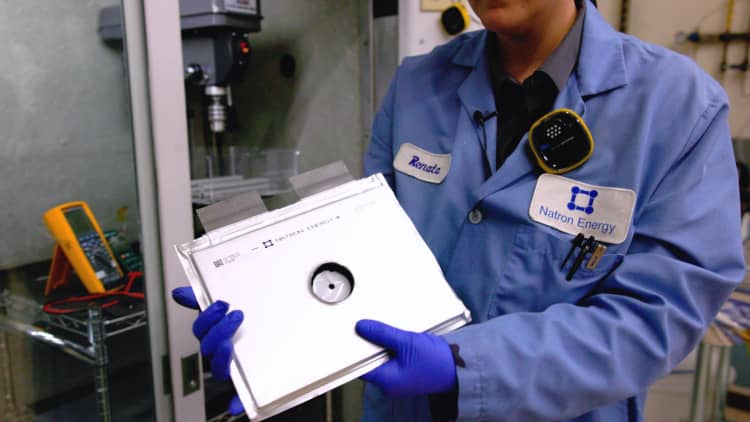Lithium-ion batteries are everywhere. They're used in consumer electronics, electric vehicles and as repositories for excess renewable energy like wind and solar.
But as the world continues to electrify, additional battery technologies will be needed to meet demand. Enter sodium ions.
Sodium-ion batteries have a similar design to their lithium-ion counterparts and can be manufactured using related methods. Both battery types generate electricity through a chemical reaction and are made up of an anode, cathode, separator and an electrolyte.
In a sodium-ion battery, lithium ions are replaced with sodium ions in the battery's cathode, and lithium salts swapped for sodium salts in the electrolyte.
Sodium-ion batteries have been around for decades, but large-scale development of the technology was abandoned in favor of lithium-ion batteries. The technology is now getting a second look.
Excitement around sodium-ion batteries picked up after the world's largest EV battery maker, Contemporary Amperex Technology Co. Limited (CATL), revealed in 2021 that it was investing in the technology, with plans to establish a basic industrial supply chain by this year.
Sodium-ion batteries can't provide the type of range for electric vehicles offered by lithium-ion batteries, but they do present some unique advantages. For instance, the materials used in sodium-ion batteries tend to be cheaper than those in lithium-ion batteries.
"It doesn't use the expensive raw materials," said James Quinn, CEO of U.K.-based sodium-ion battery maker Faradion. "There's no cobalt, there's no copper, there's no lithium, there's no graphite, which is really primarily controlled by China today."
Quinn said sodium-ion batteries are also safer since they can be completely discharged for transportation.
Natron Energy, based in Silicon Valley, is also working to commercialize sodium-ion battery technology. Customers include United Airlines and Chevron, which is using Natron's batteries in EV charging stations.
"Imagine pulling into the station. There are a whole bunch of chargers there and all the cars plug in at the same time," said Colin Wessells, CEO and co-founder of Natron. "Now the power load on the electric grid is enormous. It can be really hard for the grid to support all those vehicle chargers simultaneously. And so a lot of station operators are actually moving to a model where they would put big stationary batteries in the station to provide those pulses of power to charge the vehicles."
Watch the video to learn more about how sodium-ion batteries may fit into the evolving battery market and the challenges that companies are facing in commercializing the technology.



